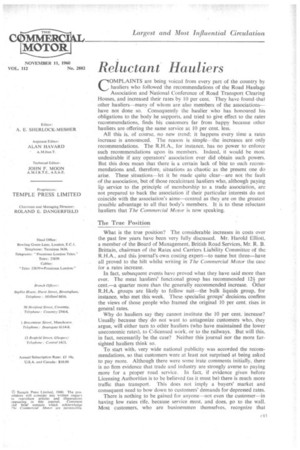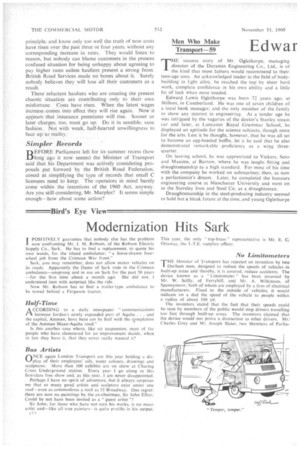Reluctant' Hauliers
Page 53

Page 54

If you've noticed an error in this article please click here to report it so we can fix it.
COMPLAINTS are being voiced from every part of the country by hauliers who followed the recommendations of the Road Haulage Association and National Conference of Road Transport Clearing Houses, and increased their rates by 10 per cent. They have found-that other hauliers—many of whom are also members of the associations— have not done so. Consequently the haulier who has honoured his obligations to the body he supports, and tried to give effect to the rates recommendations, finds his customers far from happy because other hauliers are offering the same service at 10 per cent. less.
All this is, of course, no new trend; it happens every time a rates increase is announced. The reason is simple—the increases are only recommendations. The R.H.A., for instance, has no power to enforce such recommendations upon its members. Indeed, it would be most undesirable if any operators' association ever did obtain such powers. But this does mean that there is a certain lack of bite to such recommendations and, therefore, situations as chaotic as the present one do arise. These situations—let it be made quite clear—are not the fault of the association, but of those recalcitrant hauliers who, although paying lip service to the principle of membership to a trade association, are not prepared to back the association if their particular interests do not coincide with the association's aims—centred as they are on the greatest possible advantage to all that body's members. It is to these reluctant hauliers that The Commercial Motor is now speaking.
The True Position
What is the true position? The considerable increases in costs over the past few years have been very fully discussed. Mr. Harold Elliott, a member of the Board of Management, British Road Services, Mr. R. B. Brittain, chairman of the Rates and Carriers Liability Committee of the R.H.A., and this journal's own costing expert—to name but three—have all proved to the hilt whilst writing in The Commercial Motor the case for a rates increase.
In fact, subsequent events have proved what they have said more than ever. The meat hauliers" functional group has recommended 121 per cent.—a quarter more than the generally recommended increase. Other R.H.A. groups are likely to follow suit—the bulk liquids group, for instance, who met this week. These specialist groups' decisions confirm the views of those people who framed the original 10 per cent, rises in general rates.
Why do hauliers say they cannot institute the 10 per cent, increase? Usually because they do not want to antagonize customers who, they argue, will either turn to other hauliers (who have maintained the lower uneconomic rates), to C-licensed work, or to the railways. But will this, in fact, necessarily be the case? Neither this journal nor the more farsighted hauliers think so.
To start with, very wide national publicity was accorded the recommendations, so that customers were at least not surprised at being asked to pay more. Although there were some irate comments initially, there is no firm evidence that trade and industry are strongly averse to paying more for a proper road service. In fact, if evidence given before Licensing Authorities is to be believed (as it must be) there is much more traffic than transport. This does not imply a buyers' market and consequent need to bow down to customers' demands for depressed rates.
There is nothing to be gained for anyone—not even the customer—in having low rates rife, because service must, and does, go to the wall. Most customers, who are businessmen themselves, recognize that principle, and know only too well the truth of how costs have risen over the past three or four years, without any corresponding increase in rates. They would listen to reason, but nobody can blame customers in the present confused situation for being unhappy about agreeing to pay higher rates unless hauliers present a strong front. British Road Services made no bones about it. Surely nobody believes they will lose all their customers as a result.
These reluctant hauliers who are creating the present chaotic situation are contributing only to their own misfortune. Costs have risen. When the latest wages increase conies into effect they will rise again. Now it appears that insurance premiums will rise. Sooner or later charges, too, must go up. Do it in sensible. sane fashion. Not with weak, half-hearted unwillingness to face up toreality.
Simpler Records
BEFORE Parliament left for its summer recess (how long ago it now seems) the Minister of Transport said that his Department was actively considering proposals put forward by the British Road Federation, aimed at simplifying the type of records that small C -licensees need to keep. The operators in mind barely come within the intentions of the 1960 Act, anyway. Are you still considering, Mr. Marples? It seems simple enough—how about some action?
















































































































































